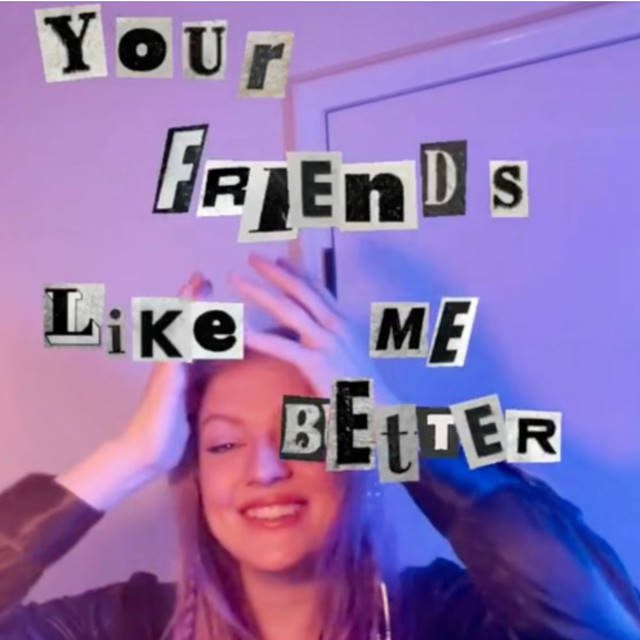Hachiku – I’ll Probably Be Asleep

‘I’ll Probably Be Asleep’ is the excellent debut album from German songwriter Anika Ostendorf who goes by the stage name ‘Hachiku’. It draws from modern dream-pop with its ethereal vocals, but also mid-90s shoegaze, and even garage rock. It is not afraid to embrace a variety of musical styles, and experiment with how they play together; this album is at its peak when Hachiku gets experimental with these genre combinations.
One track which really stood out to me was ‘Bridging Visa B’ which combines driving rock drums, stabby 80s synth, and a distorted, echo guitar to create one of the most interesting tracks the record has to offer.
Perhaps the greatest achievement of this record is its coherency; while most tracks sound different from one another, they definitely all belong in this collection. None feel out of place, but none are so similar that it becomes stale – this is an impressive tightrope walk. As a result, the album can be enjoyed in one continuous sitting, or by adding your favourite tracks to your playlist. Personally, I find it more interesting to listen to from front to back, and as such, a track-by-track analysis is necessary.
I’ll Probably Be Asleep
The opening to the album; an oppressive, sinister feedback greets you to the roughly 35 minutes long record, setting a misdirecting tone. Hachiku’s vocals quickly enter, with an echoey, eerie vibe – underneath, however, is a pop melody. As the drums, organ, and guitar start to layer in, the song quickly transforms into well-produced, catchy bedroom-pop. The vocals are the epitome of the genre, especially with Hachiku’s high notes in the last chorus. The instrumental is interesting too, specifically the guitar- it’s utilised in a number of ways: whether it spices things up in the background, or plays a catchy hook, there’s never a moment where you’re wishing the song would skip along. This song is easily a standout track on the record.
Busy Being Boring
This track is totally different to the first one, starting off with drums which are almost reminiscent of modern hip-hop. Easily the most interesting thing about this song is the use of the guitar – it combines a country feel through the use of a slide, and dream-pop through its exaggerated reverb, to create something new which lies between the two. The track reminds me of Daughter’s work, as there is a lot of space during the instrumental which creates a beautiful ambience.
You’ll Probably Think This Song Is About You
This is a much more laid-back track, which is by no means a bad thing. From the warm electric piano which opens the song, to the waltz-esque drums, it lacks the tension of the preceding tracks, and gives a respite from their emotional intensity. Hachiku layers up her vocals on this one, really putting her vocal prowess at the forefront of the song. One final note is that the guitar harmonies are notably mixed in stereo, so I really recommend listening to this one with headphones.
Bridging Visa B
This is another standout track for me – I couldn’t be more in love with the My Bloody Valentine–esque sounding guitars, the beautifully restrained vocals, the drums which drive the whole thing; I can barely think of any ways to improve this song. It is interesting to listen to – it feels like a bell curve, in that it ends in the way it began. The rising and falling tension seems to be a strong point in Hachiku’s song-writing, and its perfectly encapsulated on this number.
Dreams of Galapagos
This song starts with deep male vocals, which is almost jarring at first – it’s a complete contrast to the previous tracks, which all put Hachiku’s light, floaty voice to the forefront. Once you get past this initial discomfort, however, you’ll find a very bouncy song – the drums and backing vocals are notably more upbeat than previous tracks, and there were times where it made me want to dance. It has a tropical feel in places, which brings me to the next song:
A Portrait Of The Artist As A Young Woman
I didn’t use tropicality as a segue for no reason – the Hawaiian sounding guitars on this track certainly lean into that sound. Unfortunately, I do feel that this album dips a little in the second half – this song does not have nearly as much going on as anything in the first half. It is very much a slow burner, and it feels like you are waiting for something that never quite comes. It’s not necessarily a bad track, but it doesn’t compare to, say, ‘Bridging Visa B’.
Shark Attack
Shark Attack somewhat redeems the second half of the record – the fuzzy guitars bring back the garage sound which compliments this record oh-so-well, and it has plenty of dynamic changes, like all of the best tracks on this record do. This song feels more epic than any other on the album; the chords have this build up, and Hachiku’s vocals are clear with intent. I can’t tell you what she’s intent on, but who cares when it makes a track sound this good?
Murray’s Lullaby
I don’t have much to say about this track. It’s always a shame when the lowest point of an album is the end, but this is the case here. It didn’t leave a sour taste in my mouth; I kept the stellar earlier songs in mind. It just felt like the album faded out where it should have exploded. If this track sounded more like anything in the first half of the record, I would have enjoyed it a lot more – unfortunately, it falls victim to the same pitfalls of ‘A Portrait Of…’.
I think this album is an interesting listen. It sets out to capture emotion through sound, and I think that it achieves that for the most part. It’s definitely a good album – maybe even better than good! It’s just a shame that what could have been something incredible was dampened by a few tracks which made simple mistakes. Regardless, I definitely recommend giving this album a listen or three.
Read Isobel Mcleod’s recent Indie Midlands interview with Hachiku here.
Dylan Smiler


